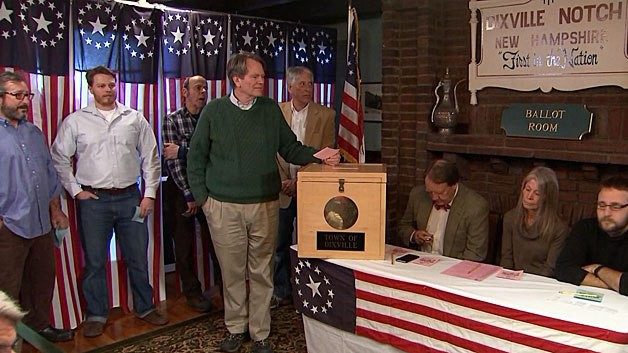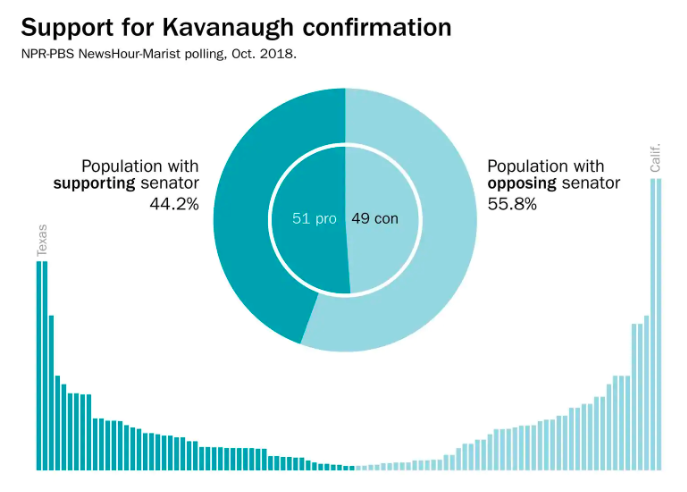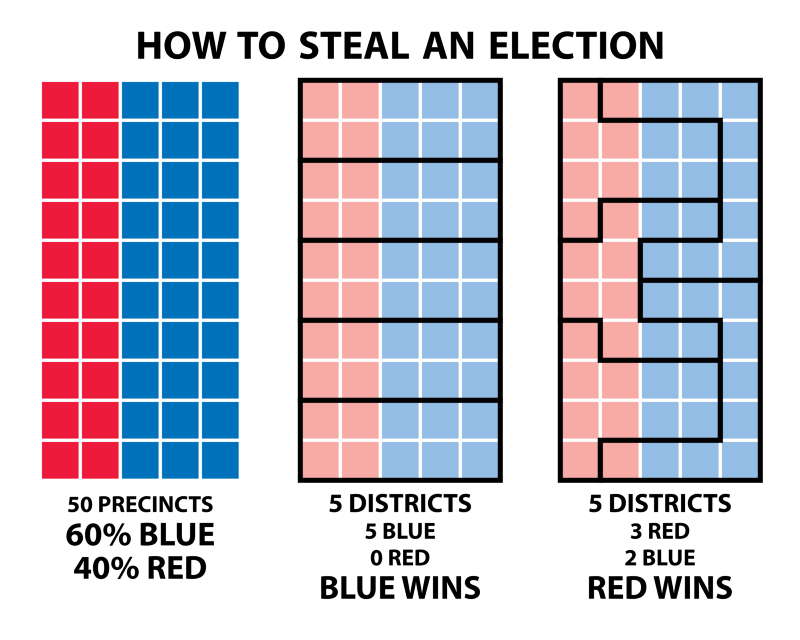One of the great myths about the United States is that it’s a democracy where all Americans have an equal say.
In fact, Californians have less say at the federal level than people in any other state. This isn’t because of campaign finance laws or “corporate control”; it’s because of the U.S. Constitution itself.
Californians are historically under-represented in the U.S. Senate
The Senate is easily the more powerful half of Congress, with the sole power to ratify treaties, confirm Supreme Court judges, and remove a President who has been impeached.
There are nearly 40 million Californians today, comprising more than 12% of the U.S. population. We are represented by 2 out of 100 U.S. senators, or 2%. In other words, the average Californian has we have one-sixth as much representation in the Senate as the average American.
If this sounds insultingly small, it is. Californians today are actually more under-represented in the Senate than residents of any state at any other point in U.S. history.
One-sixth would have seemed small to the Founding Fathers too. At the time the Constitution was adopted, residents of Virginia, the largest state at the time, received between half and one-third the representation of the average American.
Californians vote for president, but our votes don’t count
Every state but Maine and Alaska uses a “winner take all” system, where voters in each state decide which candidate gets all of their state’s electoral votes.
This system harms Californians in two ways. First, Californians get fewer electoral votes per person than residents of any other state. Second, any votes cast in a state beyond those a candidate needs to win that state are as good as thrown away—they don’t count towards the final outcome.
We saw this in a stunning way in the 2016 presidential election. Hillary Clinton won California by 3.4 million votes, paving the way for her to win the national popular vote by 2.9 million votes. But her opponent, Donald Trump, became president anyway! The outcome on the race hinged on fewer than 80,000 votes cast in Wisconsin, Michigan, and Pennsylvania—fewer people than live in Burbank!

In theory the Electoral College could be made irrelevant by the National Popular Vote Interstate compact, which California joined in 2011. However, the Compact is still needs way more states before it can take effect. Defenders of the status quo are working hard to make it a partisan issue, going so far as calling it a “wolf in sheep’s clothing.” Sure, it looks harmless, but under all that wool… democracy!
What about the primaries? Presidential primary rules are determined by the parties themselves, and change from election to election. However, what doesn’t change is that most other states vote before California. And tradition determines that voters in tiny, predominantly white Iowa and New Hampshire get to vet presidential candidates long before Californians have a say.

The U.S. Constitution does provide an important check on the power of the president: the U.S. Senate can refuse to confirm his cabinet members. But this is no help to Californians, because we are second-class voters in the Senate.
The Supreme Court is out of Californians’ hands
The U.S. Supreme Court has the power to overturn any law, federal, state, or local that it determines to be unconstitutional.
Supreme court justices are appointed to lifetime terms by the president (whom Californians don’t elect) and are confirmed by the Senate (where Californians are historically underrepresented). No checks and balances for Californians!
The recent appointment of Brett Kavanaugh demonstrates how little say Californians have in who sits on the Supreme Court. Kavanaugh was nominated by a president who, as noted above, only won because Californians’ votes didn’t count. He was then confirmed with the support of senators who, though they hold a majority of senate seats, only represent 44.2% of the U.S. Population.

Gerrymandering adds insult to injury
The U.S. Constitution does provide one (and only one) institution that theoretically provides equal representation to Californians: the House of Representatives. But even that is ruined by gerrymandering.
In 2010, fueled by a combination of audacity, powerful algorithms, and animosity towards America’s first non-white president, Republicans in statehouses across the country pulled off the most partisan gerrymander in American history. This is why, eight years later, control of the House of Representatives is uncertain, even with Democrats 8% ahead in the polls. Elections might matter, but in America, gerrymandering matters more.

California voters fully outlawed gerrymandering (in California) in 2010, but most other states still practice it.
Essentially, Californians are playing fair in a system that other states’ politicians have no reservations about gaming. And people in these other states generally have much more power over the Senate and the Presidency, whereas for Californians, representation in the House is pretty much all we have.
The U.S. Constitution doesn’t mandate gerrymandering, but it certainly doesn’t protect us against it. In June 2018, the U.S. Supreme Court declined to decide a case (for now) about one of the most gerrymandered states in the country, Wisconsin. In September, a panel of federal judges did rule that North Carolina was unconstitutionally gerrymandered, but that it was too late to do anything about it — so they should just hold the election anyhow!
Please don’t ask Californians to fix America

If the American system is so broken, why don’t Californians help fix it?
Look, it’s not like we didn’t try. As mentioned above, California has already outlawed gerrymandering in California, and joined a compact to make the Electoral College irrelevant.
The next step would be amending the U.S. Constitution. But Californians are second-class voters in the constitutional amendment process itself.
Amendments to every state constitution (other than Delaware’s) are ratified by a vote of the people. Not so with the U.S. Constitution: to pass the finish line, an amendment must be ratified by three-quarters of the state. In this process, the nearly 40,000,000 people in California are treated as “just another state,” just like Wyoming (pop. 579,000) or Vermont (pop. 624,000).
Constitutional amendments are proposed by either a 2/3 vote of both the House and the Senate (where, again, Californians are historically under-represented), or at a convention called by the legislatures of 2/3 of the states (where California is “just another state”).
The scary thing is that the legislatures of the 38 smallest states, which together comprise less than 40% of the U.S. population, could call a Constitutional Convention and ratify whatever amendments they wanted. 60% of the population could be locked out of the process entirely, including all of California.
The good news: Californians are first-class voters in California
If you’re a Californian, you might be thinking, my vote doesn’t really count. Not so!
While it may be largely symbolic at the federal level, your vote has very real power over state and local government. California has a fair system where people are always represented proportionally to population. And unlike the U.S. President, California elected officials are actually elected.
Californians also have the power of direct democracy; if our government doesn’t respond to our needs, we can pass a law (or amend the California Constitution) directly at the ballot box.
Californians can use our state government to tackle country-sized problems because California is country-sized. Compared to Canada, California has 4 million more people and an economy 50% larger.
And unlike the U.S. Constitution, the California Constitution is relatively easy to amend — Californians can fix California.
Dude, what democracy?
So it’s pretty nuts for Californians to try to solve problems through American “democracy,” where we barely have any say, when we have a real democracy that actually represents us in California.
The next time someone tells you that the best (or the only) way for us to address a policy problem is at the federal level, think hard about what that “us” means — does “us” include you?
And ask yourself, do Californians really need the help of a system of government that makes us permanent second-class voters? Or do we just need it out of our way, so we can solve these problems for ourselves?
Originally published on California Rising
